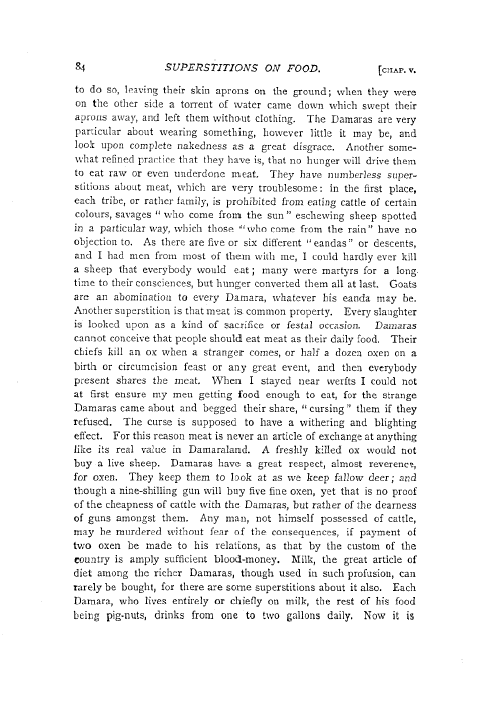84 SUPERSTITIONS ON FOOD. [CHAP. V.
to do so, leaving their skin aprons on the ground; when they were on the other side a torrent of water came down which swept their aprons away, and left them without clothing. The Damaras are very particular about wearing something, however little it may be, and look upon complete nakedness as a great disgrace. Another somewhat refined practice that they have is, that no hunger will drive them to eat raw or even underdone meat. They have numberless superstitions about meat, which are very troublesome : in the first place, each tribe, or rather family, is prohibited from eating cattle of certain colours, savages " who come from the sun" eschewing sheep spotted in a particular way, which those "who come from the rain" have no objection to. As there are five or six different "eandas" or descents, and I had men from most of them with me, I could hardly ever kill a sheep that everybody would cat; many were martyrs for a long time to their consciences, but hunger converted them all at last. Goats are an abomination to every Damara, whatever his eanda may be. Another superstition is that moat is common property. Every slaughter is looked upon as a kind of sacrifice or festal occasion. Damaras cannot conceive that people should eat meat as their daily food. Their chiefs kill an ox when a stranger comes, or half a dozen oxen on a birth or circumcision feast or any great event, and then everybody present shares the meat. When I stayed near werfts I could not at first ensure my men getting food enough to cat, for the strange Damaras came about and begged their share, "cursing" them if they refused. The curse is supposed to have a withering and blighting effect. For this reason meat is never an article of exchange at anything like its real value in Damaraland. A freshly killed ox would not buy a live sheep. Damaras have a great respect, almost reverence, for oxen. They keep them to look at as we keep fallow deer; and though a nine-shilling gun will buy five fine oxen, yet that is no proof of the cheapness of cattle with the Damaras, but rather of the dearness of guns amongst them. Any man, not himself possessed of cattle, may he murdered without fear of the consequences, if payment of two oxen be made to his relations, as that by the custom of the country is amply sufficient blood-money. Milk, the great article of diet among the richer Damaras, though used in such profusion, can rarely be bought, for there are some superstitions about it also. Each Damara, who lives entirely or chiefly on milk, the rest of his food being pig-nuts, drinks from one to two gallons daily. Now it is

